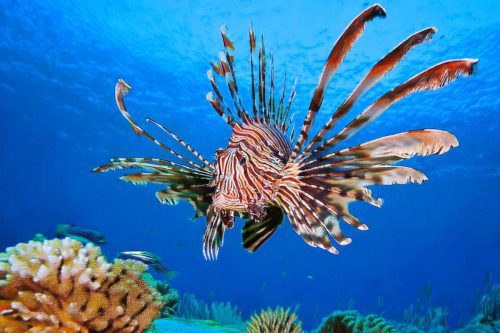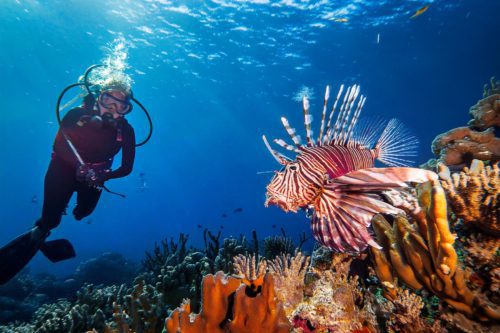Learn how to control lionfish on Bonaire and help protect the reef
Lionfish are impacting Bonaire’s marine ecosystem, posing a serious threat to coral reefs. Community-driven hunting efforts and conservation initiatives are essential for controlling this invasive species and preserving the island’s rich marine life for future generations.
The growing presence of lionfish on Bonaire
Bonaire is famous for its vibrant marine life and stunning coral reefs. But in recent years, a new resident has made its presence known in the island’s waters—the lionfish. Originally from the Indo-Pacific, lionfish have found their way to the Caribbean, including Bonaire, and their population is on the rise. This increase has raised concerns about the long-term impact on Bonaire’s marine ecosystem. So, is this a natural fluctuation, or are we witnessing a permanent shift?
Why the lionfish population is booming in Bonaire
Lionfish are not just another fish in the sea; they are an invasive species. This means they don’t belong here and can cause significant damage to the marine ecosystem. On Bonaire, the lionfish population has seen a steady increase. But what’s driving this growth?
The warm waters around Bonaire provide an ideal habitat for lionfish. Without natural predators in these waters, lionfish can reproduce rapidly, leading to population explosions. This unchecked growth threatens native reef fish, as lionfish are voracious predators. They consume small fish and invertebrates, which play crucial roles in maintaining the health of coral reefs. With fewer predators, the ecosystem balance is at risk.
The impact of lionfish on Bonaire’s marine ecosystem
The presence of lionfish on Bonaire isn’t just a numbers game; it has real consequences for the reef and the species that depend on it. Lionfish are known to reduce the population of small reef fish by up to 90% in some areas. This decline impacts the entire marine food chain, from small invertebrates to larger predatory fish.
Moreover, the lionfish’s appetite affects the reef’s ability to recover from other stressors like coral disease and climate change. When small fish are depleted, algae can overgrow the reefs, leading to further degradation of this delicate ecosystem. The increase in lionfish population on Bonaire, if left unchecked, could lead to long-term damage to the island’s renowned coral reefs.

Controlling the lionfish on Bonaire
To combat the growing lionfish population, Bonaire has implemented several control measures. Stinapa, Bonaire’s marine park authority, has been at the forefront of these efforts. They issue hunting permits to trained divers who volunteer to catch and remove lionfish from the reefs. These permits are a crucial part of the island’s strategy to keep the lionfish population in check.
Hunting lionfish isn’t just about numbers; it’s also about raising awareness. Through organized hunts and public education, Stinapa aims to involve the local community and tourists in conservation efforts. The goal is to protect Bonaire’s marine ecosystem from further damage caused by this invasive species.
Lionfish population fluctuations: analyzing the data
Interestingly, the lionfish population in Bonaire doesn’t always follow a straight upward trajectory. There have been fluctuations, with periods of growth followed by declines. But what causes these fluctuations? Data analysis shows that several factors could be at play, including environmental changes, hunting efforts, and natural population controls.
One of the key factors influencing these fluctuations is the intensity of hunting. When divers actively hunt lionfish, the population tends to decrease. However, if hunting efforts decline, the population quickly rebounds. This shows how crucial it is to maintain consistent control measures.
The impact of diving restrictions and covid-19 on lionfish control
The COVID-19 pandemic brought unexpected challenges to controlling the lionfish population. During the pandemic, Bonaire imposed restrictions on diving, a popular activity on the island. These restrictions led to a significant reduction in the number of lionfish hunts, allowing the population to grow unchecked. The pandemic also reduced tourism, which had been a driving force behind many of the conservation efforts.
The impact of COVID-19 highlights the importance of continuous and consistent management. When control efforts wane, the lionfish population can quickly spiral out of control, threatening the balance of Bonaire’s marine ecosystem.

The importance of continued hunting and community involvement
As Bonaire moves forward, it’s clear that hunting remains one of the most effective tools in managing the lionfish population. But it’s not just about reducing numbers; it’s about protecting the island’s marine life and ensuring the health of the reefs for future generations. Involving the community, including tourists, in these efforts is crucial.
Stinapa and local experts are key players in this ongoing battle. Their work in monitoring and managing the lionfish population is vital. However, they can’t do it alone. It requires a collective effort from the community, volunteers, and the government to ensure that Bonaire’s marine ecosystem remains healthy and vibrant.
Lionfish hunting specialty course
If you’re eager to make a difference and dive into action, consider taking a lionfish hunting course on Bonaire. Local dive shops like AB Dive and VIP Diving offer specialized courses that train you in the safe and effective removal of lionfish from the reefs. These courses aren’t just about learning to hunt; they’re about understanding the impact of lionfish on the marine ecosystem and how you can help protect it. Through hands-on experience, you’ll learn to use the proper equipment and techniques to hunt lionfish while ensuring the safety of both the diver and the reef. By taking a course you’ll be contributing to Bonaire’s conservation efforts, gaining valuable skills, and playing a direct role in preserving the island’s vibrant underwater world.
Stay and dive: the perfect base for your lionfish hunting adventure on Bonaire
For those passionate about diving and eager to contribute to lionfish control on Bonaire, finding the perfect place to stay is essential. Belmar Oceanfront Apartments offers an ideal base for your adventures. Located just steps from the water, making it convenient to dive right in and participate in lionfish hunting. Enjoy the stunning ocean views from Belmar Oceanfront Apartments and immerse yourself in the underwater world, knowing you’re helping to protect Bonaire’s precious reefs. Check out our other oceanfront villas and oceanfront apartments.

Securing the future of Bonaire’s reefs
The rise of the lionfish population on Bonaire is more than just a temporary fluctuation. It’s a challenge that requires ongoing attention and action. By maintaining control efforts and involving the community, Bonaire can protect its marine ecosystem from the threat posed by this invasive species. The importance of continued hunting and vigilance cannot be overstated. For Bonaire, securing the future of its reefs depends on the actions we take today.